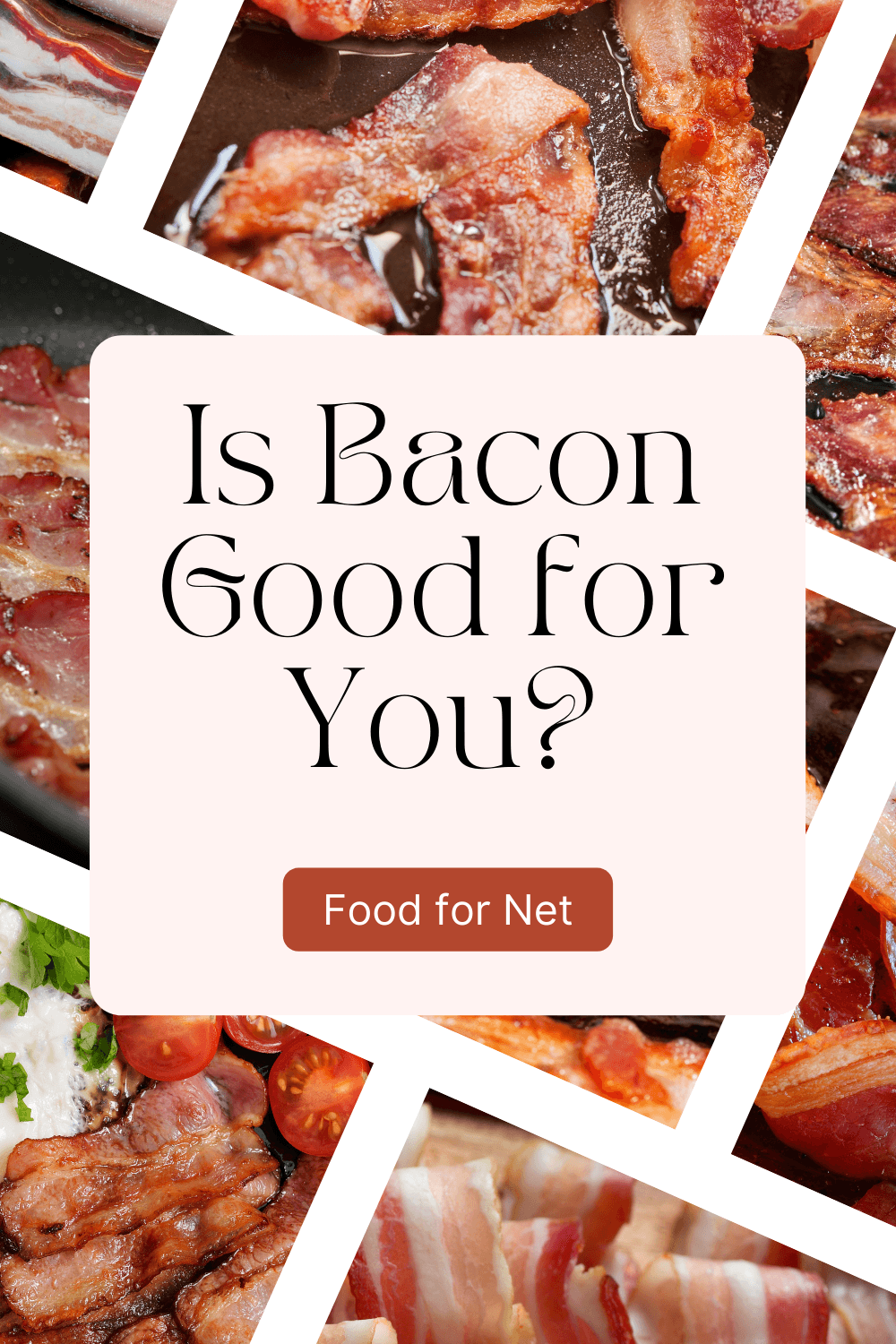
Bacon isn’t known for its health benefits. Its best features are to do with the taste of the meat instead, its smell, and that satisfying crunch when it’s cooked. When it comes to health, few people would ask is bacon good for you? Most of us are already confident that bacon is a horrible choice – we just love it too much to care.
Even so, it’s high time to take a closer look at bacon and think about how it really impacts your body. After all, if you’re a bacon lover, it’s important to know whether bacon can be enjoyed in small quantities or whether it should be avoided entirely.
What about health benefits? Does bacon have any saving graces?
The presence of some good features wouldn’t be too surprising. Controversial foods like eggs, butter, and coconut oil are now recognized to be beneficial at least some of the time. Could bacon be similar? Let’s take a look.
Is Bacon Good For You?
- Benefits Of Bacon
- The Risks And Problems With Bacon
- Do The Benefits Outweigh The Risks?
- Is There Healthy Bacon?
- Final Thoughts
Benefits Of Bacon

Surprising as it might seem, bacon does have some benefits.
The Macronutrients
First of all, bacon is a source of high-quality protein, meaning that it contains all the essential amino acids. Protein is vital, as it is part of every cell of your body, helping to make sure that your muscles, tissues, and bones are healthy and function as they should.
Protein also helps to keep you full. Eating protein rich meals regularly means that you’ll stay satisfied for longer, which can help to prevent snacking.
While bacon isn’t the best possible source for protein, it’s better than you might expect. Plus, bacon cooks fast, which is perfect if you need protein in a hurry.
You’ll often see bacon on keto or low carb diets, as it contains barely any carbs. The low carb content is relevant for health too. After all, some theories suggest that carbs are responsible for many health problems. Whether that’s true or not is debatable (you can read more about the controversy here). Still, if you are avoiding carbs, then bacon is an easy choice.
Bacon is, of course, a source of fat too. Whether this is good or bad depends on your opinion about fat and saturated fat. Remember though that bacon doesn’t just contain saturated fat, there are some monounsaturated fats present too.
Plus, fat itself doesn’t cause weight gain. Fat is simply a source of energy. Whether it makes you gain weight or lose it depends on your diet as a whole.
Nutrients
Bacon does contain nutrients too, including various B vitamins, selenium, phosphorous, iron, and potassium. The iron is particularly important. It’s easy to be deficient in iron, which has many side effects and can even be dangerous in the long term.
These nutrients aren’t exclusive to bacon, of course. You’ll find a similar balance in other pork products. Plus, all types of meat tend to be nutrient dense.
Still, it’s good to know that you’re getting some nutrients from bacon.
Can Improve Your Mood
Eating bacon might improve your mood too. This effect partly comes from the vitamins and minerals, as your body tends to function better when it has all the nutrients it needs.
Mostly though, the mood boosting effect of bacon is simply because many of us love bacon. Eating food you enjoy tends to increase your mood. Funny that. There’s nothing wrong with that effect though. Sometimes we all need a quick pick-me-up.
The Risks And Problems With Bacon

Saturated Fat
Bacon tends to be fatty, which also makes it high in calories. Some of this fat is monounsaturated and is generally seen as healthy. Still, roughly 40% of the fat in bacon is saturated.
There’s a lot of debate about saturated fat and exactly what it does to health. Many people are now saying that saturated fat, especially in moderation, isn’t as unhealthy as we’ve long assumed. Saturated fat might even have benefits in the right quantities.
Still, a high saturated fat intake doesn’t seem like a good idea. There are too many potential risks and the benefits are minimal.
There’s one piece of good news though. The amount of fat in bacon varies depending on the type you choose. Center cuts of bacon can still be delicious and contain much less fat than streaky bacon. Such cuts can be an excellent way to enjoy bacon while protecting your health.
Sodium
Bacon is often high in sodium. If you’re an athlete or don’t get much sodium in your diet, the high sodium content might be fine.
However, many of us are consuming too much sodium already. People in this situation often need to cut back their sodium intake, which includes eating less bacon.
Turning to low sodium bacon can help, although some of us struggle to do so, as low sodium bacon doesn’t taste as amazing as the sodium-packed version.
Cancer Risk
Bacon is considered a type of processed meat, as it is cured with salt or nitrates during preparation. All types of processed meat, including bacon, are thought to increase the risk of bowel cancer.
One study found that eating around 2 ounces of processed meat increases the risk of colorectal cancer by 18%.
While there’s a clear need for concern, that 18% figure isn’t as bad as it first sounds. The percentage refers to relative risk. This means that if your risk was 5% or so beforehand, eating 2 ounces of processed meat daily might raise it to 6%. Eating bacon once or twice a week would have an even smaller effect.
The increased risk of cancer may be partly due to the nitrates that are added to help preserve meat. While nitrates are found in plants too, the ones in meat appear to be much more harmful. This may be due to interactions between the nitrates and protein, particularly when the meat is cooked over a high heat.
However, the topic is still under investigation, so nitrates might not be the only culprit.
May Increase Heart Disease Risk

There are a few concerns about bacon and heart disease, starting with the saturated fat content. Dietary advice has long focused on saturated fat, suggesting that cutting down your intake can decrease heart disease risk. Yet, the link between saturated fat and heart disease isn’t actually that strong.
A similar issue is true for the cholesterol in bacon. Cholesterol in food is often seen to increase heart disease risk. Despite this, the cholesterol we eat often doesn’t influence our blood cholesterol much at all (which is the reason that eggs are now seen as a health food).
The salt in bacon could influence heart disease risk too, as high sodium raises blood pressure, which is a heart disease risk factor. Finally, the high calorie content of bacon increases the risk of weight gain, which is never good for heart disease risk.
With so many potential problems, avoiding bacon could make sense – especially if your heart disease risk is already high.
Might Cause Other Health Problems Too
Cancer and heart disease aren’t the only issues. Diets high in processed meats have been linked to a variety of problems, including migraines, kidney disease, and asthma.
That’s not even counting all of the health problems that might come from weight gain or excess sodium. Any problems are likely to be much worse if your bacon consumption is high or if you eat many other high sodium and high calorie foods.
It’s Easy To Have Too Much
Bacon is delicious and a favorite food for many people. It’s easy to have more bacon than you intend to in a serving or to eat it far too often. Even if you’re trying to cut down, who can resist the smell of bacon frying in the morning?
People just beginning on a keto or low carb diet are particularly vulnerable. After all, bacon can seem like an ideal keto food and is sometimes promoted as such. The balance of carbs, protein, and fat in bacon means that keto dieters might eat bacon regularly, even multiple times per day.
But, even if you’re not concerned about the saturated fat in bacon, the other health concerns are significant.
Do The Benefits Outweigh The Risks?
Bacon has some good features and some bad ones. It’d be easy to look at the balance, then say that bacon is healthy. After all, cancer risk might seem far-fetched, while it’s easy enough to keep your sodium and levels in check.
Yet, calling bacon healthy is short-sighted. There are some benefits, true, but those same benefits are in countless other foods. You could even turn to red meat which, while still controversial, appears to be safer than processed meats like bacon.
The nutrients are easily found in other foods too. There are even plenty of low carb protein rich foods that are less problematic than bacon.
Is There Healthy Bacon?

Some companies try to produce healthier types of bacon, like products that use nitrates from plants. And, while bacon is traditionally cured, you can find uncured bacon too. The lack of curing drops down the nitrate content considerably, while the flavor isn’t as different as you might expect.
In fact, low sodium uncured bacon still tastes like bacon, so it’s a healthier swap if you don’t want to give up your bacon. Just remember that you’re not bypassing all of the issues that
There are also bacon-like alternatives, including turkey bacon, tempeh bacon, tofu bacon, and oddly enough, eggplant bacon.
Turkey bacon is often seen as healthier than regular bacon, as it is lower in calories and fat. Still, this bacon often has nitrates too and can be just as processed as bacon made from pork.
Final Thoughts
Bacon clearly isn’t a health food, but opinions are mixed on whether you need to cut it out of your diet entirely. Having a little bacon every so often may be completely fine, especially if you focus on a healthy diet most of the time.
This is true for most foods. Your health isn’t determined by the individual foods that you eat and don’t eat, but by your diet as a whole. People who eat a varied diet, with plenty of vegetables, legumes, and whole grains tend to do better than those who rely on processed foods or who have a very restrictive diet.
If bacon ends up being part of your varied diet, so be it. Just try to avoid having bacon every day or even every other day. It’s best kept as an occasional treat.
Think about what you’re eating with bacon too. Using bacon as an ingredient in a vegetable-rich meal, for example, will be much healthier than making a greasy fry up with hash browns, bacon, eggs, mushrooms, and onions – all fried in butter.
Frequently Asked Questions
Is Bacon Gluten Free?
Like all meat, bacon is naturally gluten free. But, this doesn’t guarantee that all bacon products are gluten free. Some companies use additives or flavorings that contain gluten. This is why it’s always important to check the ingredient labels carefully.
How Much Protein Is In Bacon?
Bacon is an impressive source of protein, with a 3.5 ounce serving of cooked bacon containing around 37 grams of protein. Or, for a smaller 3 slice serving, you get roughly 12 grams of protein.
This protein content makes bacon filling, particularly if you’re serving it with eggs as well.
Is Bacon Pork Belly?
Bacon comes from the fatty parts of the pig, which can include the sides, back, or belly. Bacon from pork belly is also known as streaky bacon or side bacon and is particularly popular in the United States.
However, you can also find pork belly that has been cut as a slab. This isn’t smoked or cured and isn’t considered bacon at all.
Is Bacon Good For Weight Loss?
Some keto and paleo dieters might say yes, as bacon can be part of a high fat weight loss diet. However, for most people, bacon isn’t a great weight loss choice. After all, it’s high in fat and calories. While it does offer plenty of protein, there are plenty of lower calorie sources of protein.
Is Bacon Low FODMAP?
Yes, because bacon is mostly protein and fat, FODMAPs aren’t an issue. However, you’ll still need to watch for additives, as some of these could contain FODMAPs or cause other issues.
And, despite being low in FODMAPs, bacon isn’t ideal for people with irritable bowel syndrome (IBS). Processed fatty meats like bacon often make symptoms worse, so it’s best to limit your intake.









 15 Best Foods For Bones, Plus Five Delicious Bone-Building Dishes
15 Best Foods For Bones, Plus Five Delicious Bone-Building Dishes
Leave a Reply